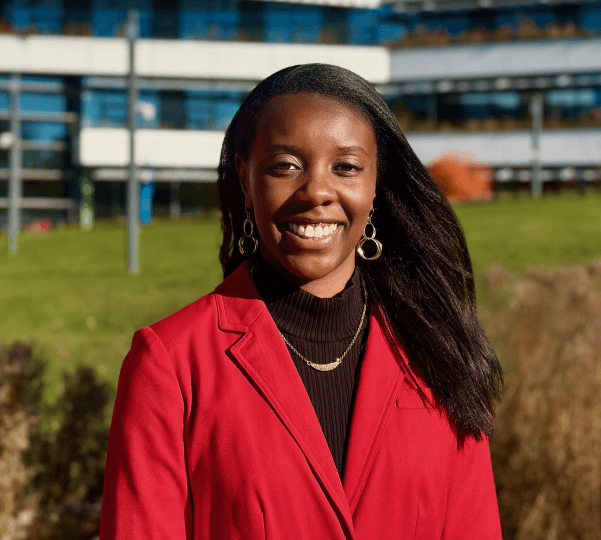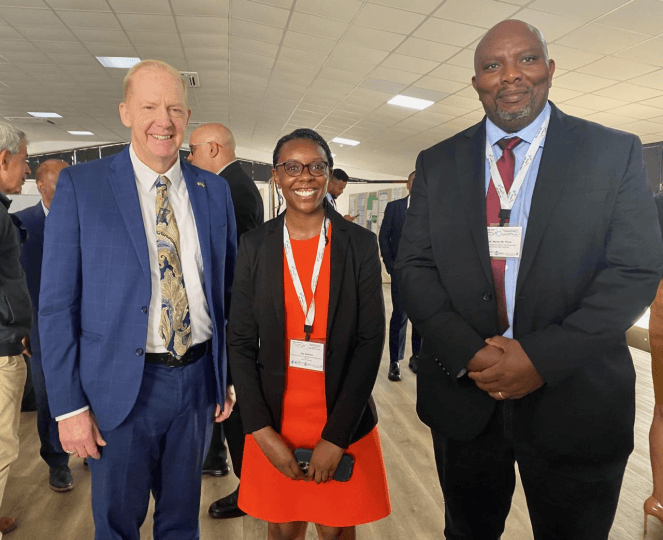Atte Kadoma, G6 Ph.D. candidate in materials science and mechanical engineering
Atte Kadoma grew up in a family of scientists and engineers. Her favorite TV show as a young girl? “The Magic School Bus.” Family weekend trips? Usually to science museums in her home state of Minnesota. Summer vacation? Typically spent at science camps.
Kadoma likely would’ve always grown up to be a scientist or engineer, but didn’t know in what field until high school, when her interest in materials science sharpened during a weeklong University of Minnesota program run by the state chapter of ASM International (formerly the American Society of Metals). Tasked with determining why a component had failed using non-destructive tests and then presenting the findings, she discovered how much she enjoyed communicating science.
“I remember working really hard on that final presentation,” Kadoma said. “I wanted to make it really engaging, incorporate some of the demos that our instructors had told us about, and even infuse some kind of humor into it. So I gave the talk for our group, and the instructors afterwards were really, really impressed.”
Those instructors suggested Kadoma stick with materials science – so she did. First came a bachelor’s degree in materials engineering at Iowa State University. Within a year, she arrived at the Harvard John A. Paulson School of Engineering and Applied Sciences (SEAS). She’s now in her sixth year of her Ph.D. in materials science and mechanical engineering, working out of the lab of Zhigang Suo, Allen E. and Marilyn M. Puckett Professor of Mechanics and Materials.
“My dissertation topic is basically how polymers degrade and age under environmental stressors, such as heat, moisture, and pH,” she said. “The insights to these are key in designing plastics that are both mechanically durable and environmentally responsible.”
Kadoma’s path to Harvard began almost as soon as she joined Iowa State University. As a freshman, she became an undergraduate researcher in the polymer lab of Martin Thuo, a former postdoctoral researcher at Harvard under George Whitesides, Woodford L. and Ann A. Flowers University Research Professor. Kadoma’s research at Iowa State focused on molecular electronics, probing how self-assembled molecules might function as tiny components in next-generation devices. A summer internship at Stanford after her junior year exposed her to stretchable electronics, cementing her interest in the topic.
“He was the one who encouraged me to apply to Harvard,” she said. “He said he’d seen me do some really outstanding research, and I was really good in my courses, so I should apply here.”
The Suo Group at SEAS had already developed a gel-based, stretchable audio speaker, making it a compelling place for Kadoma to continue her studies.
“When Professor Zhigang Suo and I spoke, he said that there's a lot of stuff that has already been done in this area,” she said. “But something a lot of people are really interested in nowadays is sustainability, particularly plastics. He thought this is a new direction that we should look at, and he wanted me to spearhead that. Zhigang has been a really great mentor to me.”
Atte Kadoma between U.S. Ambassador to Mauritius Henry Jardine and North Carolina State University professor Martin Thuo at the International Polymer Characterization Forum in Mauritius
Earlier this year, Kadoma traveled to the African nation of Mauritius for the International Polymer Characterization Forum (POLY-CHAR). There, she presented her work on hydrolytic cracking, how water can damage certain plastics. In very alkaline (high pH) settings, water can react more easily with the plastic’s chemical links, leaving it more likely to crack under stress. This matters in real projects: tiny plastic fibers are sometimes mixed into concrete to help it resist bending and cracking, but concrete’s highly alkaline interior can speed up that water-driven breakdown, weakening the fibers and reducing the benefit. Understanding this helps engineers reuse plastic materials more safely and sustainably.
Kadoma received the award for best oral presentation at POLY-CHAR and met with both Mauritian government officials and the U.S. ambassador to Mauritius, Henry Jardine. It was a full-circle moment for her, as Thuo was there to be honored for his work enabling collaboration between U.S. and African scientific institutions.
“He acknowledged me in his slides as one of his students who has enabled him to drive this global progress,” Kadoma said. “He's been a continued mentor for me all these years.”
This wasn’t Kadoma’s first international stage. She presented at the 12th International African Materials Research Society meeting last year in Kigali, Rwanda. The location – bordering her extended family’s home country of Uganda – made the experience especially meaningful as she built scientific and cross-cultural connections.
“I'm really interested in global collaborations,” she said. “But I think because of my family background, my own experience having grown up in the United States, conferences between US and African institutions are really close to my heart.”
Beyond the lab, Kadoma is focused on building community at SEAS. She has served as President and then Treasurer of the Harvard Griffin Graduate School of Arts and Sciences Science Policy Group and as a student organizer on the Harvard Materials Research Science and Engineering Center Leadership Council. In these roles, she has helped organize policy discussions and professional-development workshops designed to connect science to society and foster community across Harvard.
Kadoma is now focusing on finishing her final year at SEAS. Bolstered by conversations at POLY-CHAR, she envisions a career that bridges science, law, and policy – perhaps in technology transfer, helping bring sustainable innovations to market, or in international policy, shaping global sustainability initiatives informed by scientific insight. With family roots in Uganda and a deep appreciation for global perspectives, she is passionate about solutions that transcend borders and drive real environmental progress.
Press Contact
Matt Goisman | mgoisman@g.harvard.edu

